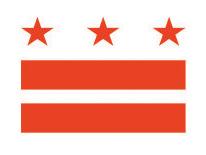
The District of Columbia Government consists of three branches of government: Executive, Legislative, and Judicial. The current form of government was established by the District of Columbia Home Rule Act in 1973. Although local officials have the authority to pass laws and govern local affairs, the United States Congress maintains the power to overturn local laws. Furthermore, unlike any other jurisdiction in the country, residents of the District of Columbia are not represented by voting members of the United States Congress.
Executive Branch
The executive branch is governed by an elected Mayor who serves a 4-year term. The Mayor has the sole authority and responsibility for the daily administration of the District government. The City Administrator is appointed by the Mayor and is responsible for the day-to-day management of District government agencies, setting operational goals and implementing the legislative actions and policy decisions of the Mayor and DC Council.
The current organization of the District government also includes four Deputy Mayors who, reporting through the City Administrator, manage the day-to-day operations of agencies within a defined cluster.
Although most District agencies report directly to the Mayor, some agencies are independent or classified as regional bodies. For example, the Office of the Chief Financial Officer is an independent agency (an arrangement that is unique to the District government).
Legislative Branch
The legislative branch consists of a 13-member Council. The Council of the District of Columbia includes one Member from each of the District’s eight wards, four At-Larger Members, and a Council Chairman. Members of the Council serve 4-year terms on a staggered election cycle. Like any legislative branch, the Council passes laws, approves the District’s budget, and is responsible for general oversight of the executive branch.
The Legislative Branch also consists of 41 Advisory Neighborhood Commissions. ANC’s represent a small sub-set of each Ward in the city, thereby having the closest official ties to the people in a neighborhood. ANC’s present their positions and recommendations on issues to various District government agencies, the Executive Branch, and the Council. They also present testimony to independent agencies, boards, commissions, and Federal agencies.
Judicial Branch
The judicial branch consists of the court system and a handful of boards and commissions that support the court system. The Superior Court of the District of Columbia is the local trial court. The Superior Court consists of a chief judge and 61 associate judges that hear cases involving criminal and civil law. The District of Columbia Court of Appeals is the highest court and is similar to a state supreme court. The Court of Appeals consists of a chief judge and eight associate judges. All judges in the District of Columbia are appointed by the President of the United States and confirmed by the US Senate.


